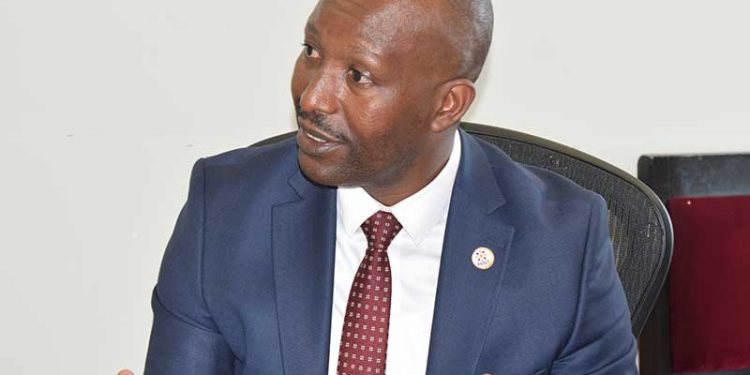Logistics industry stakeholders in the East Africa Community (EAC) want Partner States to adopt and implement a regional coordinated approach on COVID-19 to eliminate related Non-Tariff Barriers and spur trade.
This is in response to an interministerial meeting held in Uganda yesterday that agreed that the Uganda government will clear all truck drivers and their accompanying staff with negative Covid 19 PCR certificates taken in the last 72 hours.
In a letter addressed to the 1st Deputy Prime Minister and Minister of EAC Affairs in Uganda, the Federation of East African Freight Forwarders Associations (FEAFFA) said that the truck drivers will not benefit from the 72 hours validity opening that has been granted.
“Given that trucks have been at the border for a couple of days, most of the truck drivers’ Covid19 test results will not benefit from the 72 hours validity opening that has been granted,” Fred Seka, FEAFFA president said, adding that to clear the impasse at the borders, Regional Electronic Cargo Drivers Tracking System (RECDTS) should continue to be used.
“This will allow truck drivers time to adjust to the new requirement while at the same time clear the traffic snarl-up at the borders.”
In a press release today, the East African Business Council (EABC) also echoed similar sentiments.
“We urge Partner States to embrace the RECDTS to accommodate the emerging COVID-19 trends as it offers minimal disruptions to the private sector, especially the transport and logistics sector,” the statement signed by the EABC Executive Director Mr. John Bosco Kalisa read in part.
According to FEAFFA, Uganda should engage the EAC to fast-track onboarding other Partner States in the review of the RECTDS to accommodate the changes necessitated by the emergence of the Omicron variant. This will promote regional harmony and the spirit of regional integration.
“Consider providing free covid19 testing for truck drivers as essential service providers in government health facilities as is being done for the rest of the general population and leave the option of paying for those willing to pay” Seka’s letter read in part.
FEAFFA also wants Uganda to consider retaining the validity period for the truck drivers’ test results beyond the 72 hours to 14 days as a trade facilitation measure and also ensure that a driver is tested once every route.
“You may wish to know that majority of the truck drivers to Uganda are from Mombasa port where they are tested prior to loading cargo. The Freight forwarding industry appreciates the threat presented by the Omicron variant,” Seka said.
The government of Uganda government should also consider supporting private sector-led initiatives aimed at enhancing reliability and predictability in the transport and logistics sector such as the Journey Management System and Self -Regulation. These, according to Seka, will ease government collaboration with the sector while guaranteeing professional logistics services to the business community.
The EABC is calling upon the EAC Partner States to mutually recognize COVID-19 test and vaccination certificates through the EAC Pass; Eliminate the need for confirmatory testing and quarantine for persons with valid COVID-19 test and/or vaccination certificates.
“The newly introduced COVID-19 mandatory testing of truck drivers entering or transiting through Uganda highly hampered the smooth flow of cargo across the region. The new measure mandated truck drivers to pay USD. 30 COVID-19 test each time they cross into Uganda is increasing the cost of doing business and result in traffic pile up at the border posts plus increased turnaround times and demurrage charges,” EABC statement said.
The East African Business Council (EABC) applauded concerted efforts by both the public and private sectors in Uganda to resolve the week-long stand-off on the newly introduced COVID-19 mandatory testing of truck drivers entering or transiting through Uganda.
Dr. Henry Mwebesa, Director General in Charge of Health Service issued a list of 66 laboratories spread in the region that must carry out the test. Four labs will be stationed in Burundi, 20 in Kenya, five in South Sudan, Rwanda 10 with Uganda and Tanzania having 22 and five labs respectively. Out of the total labs, 34 are public and 32 are private facilities.
The regional assessment team was composed of experts from partner states with each country member drawing 2 lab experts, World Health Organization lab experts from each partner state, and Ministry of Health officials.
Uganda authorities, on 20th December last year, directed testing of all incoming travelers, including truck drivers. The directive proposed the review of the Regional Electronic Cargo and Drivers Tracking System (RECDTS), which allows Covid 19 testing after 14 days, to a shorter duration of 7 days due to the high transmissibility of the Omicron variant, which has a shorter incubation period.
In a recent statement, Kenya Transporters Association (KTA) threatened to pass the extra testing costs of US$ 300 charged per test to the cargo owners as an additional cost. KTA also wanted clarification of how frequently the test will be carried out and their duration. In the other EAC, Covid 19 tests are carried out free of charge.
Since 2020, the region has been operating a RECDTS, an initiative that was supported by Trademark East Africa (TMEA), to monitor Covid 19 cases across the borders. Ministries of health in EAC share Covid 19 results from various tests centers and the results are acceptable across the borders, easing crossing time.





